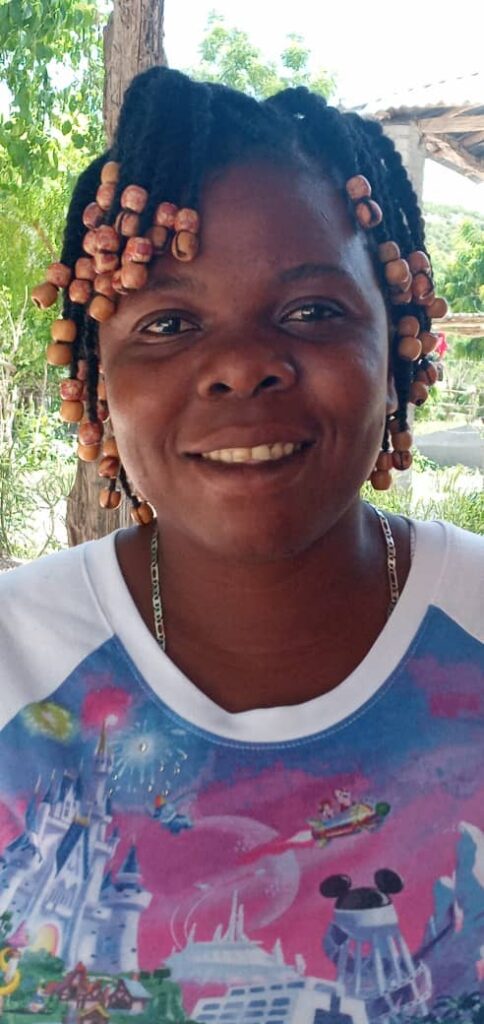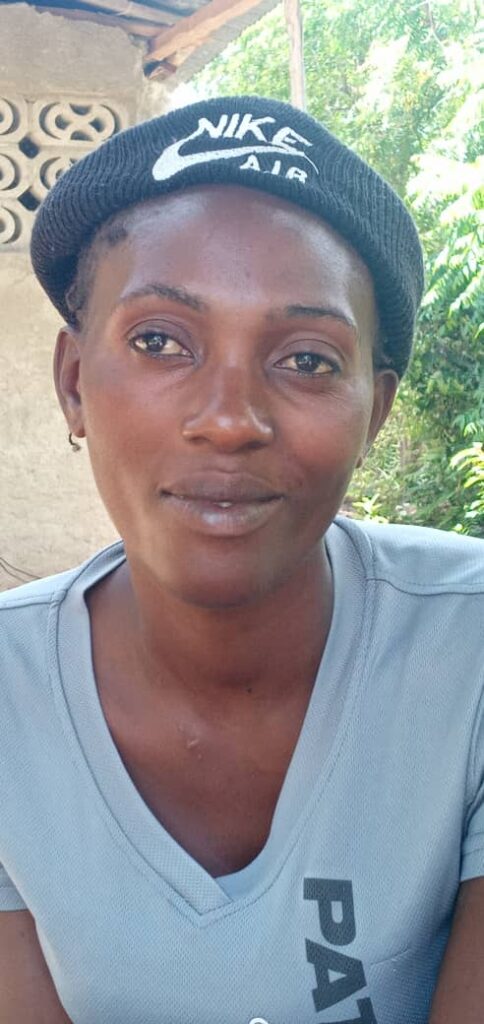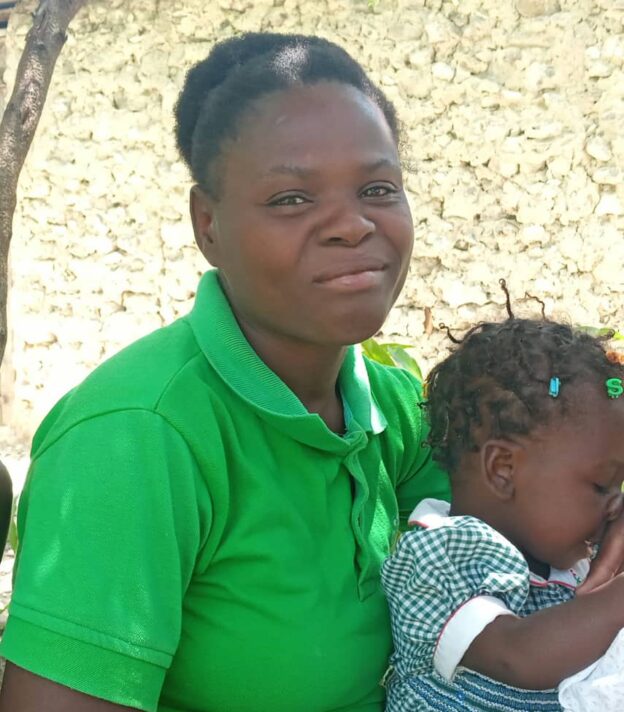Wislande Racius lives with her partner and their three children in Gwomòn, a small corner of Dezam, a large rural section of Verèt Commune. She and her family have been part of the CLM program since December.
Before they joined the program, she and the kids were living with her mother and a brother. She didn’t have her own place. She was contributing to the household whenever she could with a small business selling bleach crystals in small bags to folks planning to do laundry. She had about 1500 gourds — something like $15 right now — in the business, money that her partner gave her. He did farming, working sometimes as a day-laborer and sometimes getting paid larger sums for completed jobs.
During their first weeks in the program, they moved to the home of the godfather of one of her daughters, but the man grew tired of their presence in his home, and started to show they were no longer welcome. “He would make fun of us for being mountain people. We had to move.” So her husband quickly put up a small house on a plot of land he had begun to buy through a kind of rent-to-own arrangement.
She asked Fonkoze to give her goats and a pig as her two enterprises, and she got the two goats right away. Before her case manager bought the pig, however, they had a serious talk. Pigs have been dying a lot lately. The CLM team has had trouble getting all the necessary vaccinations for the pigs it distributes. So Daphnée, the case manager, was reluctant to provide a pig that was likely to die. The result of their conversation was that Wislande asked for a third goat in place of the pig. One of the nanny-goats gave birth to a small buck, but it did not survive. All three of the nannies seem healthy, however, and she expects more offspring in the months to come. But though she’s excited by the prospect, she isn’t really sure what she wants to do with additional goats. She doesn’t yet have a plan.
She also wants to get back into business. She hasn’t been selling bleach for a while now. But she has two problems. On one hand, her home doesn’t yet have a door. She is reluctant to go too far without the security of knowing there is a door she can lock. On the other, her youngest child is just a year old, and now that she and the family are in their own house, she no longer has someone obvious to leave the baby with when she goes out. “If your children are young, you have to find someone to leave them with.”

Yoline Dort lives in Ti Plas Mori, near the eastern edge of Dezam. She and her husband, Franslin, live in a small home with their one child.
Before they joined CLM, all the household’s income came from him. He struggled as a day-laborer, work that is both poorly paid and irregular. But things got harder and harder when Franslin became ill. Yoline isn’t sure what is wrong. She thinks that he was poisoned by a neighbor. But he was initially so weak that he couldn’t get out of bed. He’s has gotten a little bit better, but he cannot work yet. “Just the other day, he had to stop to rest three times just to walk to his mother’s house.” The mother’s house is just a block or so away.
His inability to work has impacted the family. Not only have they had much less to eat, but their boy missed a year of school because they could not pay the tuition.
Yoline chose goats and small commerce as her two enterprises. She received two goats from the program, and both are healthy. One already had a pair of kids.
She used the business capital that the program made available to start a business selling laundry products: soap, detergent, and bleach. She sells her merchandise twice-a-week at the large market in downtown Dezan, which is nearby. She can sell out her product in one or two visits to the market, so she is beginning to establish a good stream of income.
But that was actually the second business she started as part of CLM. She bought a sack of cooking charcoal with money from a food and transportation stipend she received during a three-day refresher training, and she sold it to neighbors by the bagful. She has been in the charcoal business ever since. The charcoal sells fast, and though the profit is small — especially with the price of a sack increasing because of the rainy season — she can count on it.
Between the two businesses, Yoline has been able to feed the family even without help from Franslin. She’s even been able to grow the business by participating in a sabotay, a kind of savings club popular in Haiti. She pays a hundred gourds into her club every day, and can plan with its organizer when she would like to receive her savings. She’s also confident that she’ll be able to send her boy to school once more come September. “They don’t ask me to pay the whole tuition at once. I will make payments throughout the year.”
She’s working on another source of income as well. With the program’s encouragement, she planted a small field of hot pepper plants. “My mother used to plant them, but this is the first time for me.” It is taking a lot of work, because she has to water them. The rains haven’t been enough. But when the peppers start ripening, she’ll have something additional she can bring for sale to the market each time she goes.

Mirome Agréus and her four children live in a beat-up two-room house that her older sister originally rented to send her own three children to school in downtown Dezam. The sister moved Mirome to the house when the latter had grown so sick that she could not take care of herself. Mirome’s partner had refused to take responsibility and had abandoned her and their children.
The sister took her to hospital after hospital. Mirome eventually spent three months at the Partners in Health University Hospital in Mibalè. When it was finally time to come to the house that had become her home, she could not find a motorcycle taxi willing to bring her from the place on the main road where the pick-up truck dropped her off up to the house. Motorcycle drivers didn’t want to carry someone so obviously sick. “My sister had to put me on her back and carry me.”
By then, the sister’s husband had left her. He felt she had spent too much of the couple’s money on Mirome. She was supporting herself, Mirome, and their seven children doing laundry for other families and selling used clothes.
That fact that neither of the women is from Kristan, the neighborhood of Dezam where they live, complicates a lot for Mirome. “We have no one here to take a problem to.” For one thing, she had no land that she could build a home on. Her case manager, Fabienne, talked to the members of the local committee of community leaders who volunteer to support CLM, and one of them was willing to sell Mirome a small piece of his land for the very-reduced price of 15,000 gourds.
But Mirome simply didn’t have the money. Her sister could give her 5000, but no more. So the CLM team found some extra funds and gave her the other 10,000. She still needs to build her house, and she lacks resources to buy the materials that she is required to provide, but here again the committee has begun to help her out. Various members have donated lumber she’ll be able to use as support posts.
She has received three young female goats from Fonkoze. Like Wislande, she initially wanted a pig, but also like Wislande she came to agree with her case manager that it wasn’t the right time to buy one. One of her goats even had a small kid when she first got it. And though that kid did not survive, Mirome thinks all three are pregnant now.
But even if she succeeds with her goats, she will have a problem. Goats won’t provide the steady trickle of income that she’ll need to manage her children’s daily needs. She will need eventually to establish a daily income, and her most likely path towards doing so is small commerce. But right now she’s reluctant to start one because her youngest child is still nursing. In principle, she could start one near to her new home, but she’s afraid people won’t buy from her because she still feels like a stranger there.
